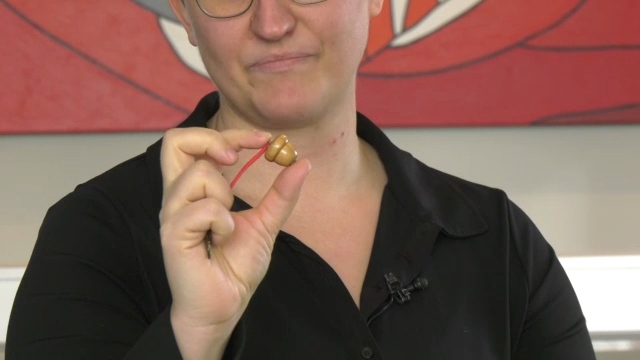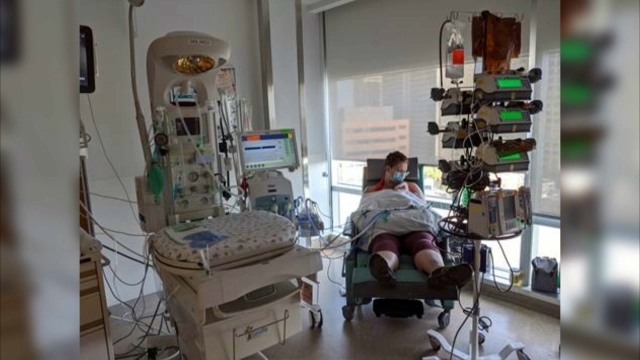'Even the playing field': New non-profit hopes to raise profile of congenital heart defects
An Alberta couple wants to ensure parents-to-be get the full picture when getting a sonogram after their son was born with a severe heart defect.
Amy Porter and her wife Sam learned in 2020 they would be expecting a baby boy. At 20 weeks, Amy's anatomy scan showed that her son, Artie, was looking healthy.
That scan missed a serious heart condition called transposition of the great arteries, where the position of the two main arteries carrying blood from the heart is switched, preventing proper flow.
Eight weeks later, Amy underwent an ultrasound as a precaution since doctors were concerned she measured large. That scan made a life-saving discovery.
"We found out that he had a very critical heart defect," Amy told CTV News Edmonton.
"I could tell that we were looking at his heart, but I didn't know why. And they are not legally allowed to tell you anything about your scans," she added. "So I kind of just had that in the back of my head."
She later found out from her obstetrician that she was being referred to specialists who would help her deliver her son.
"The only other information she gave was don't Google it," Amy said with a laugh. "I am a research nerd, and I find research very comforting. I feel if I know everything about something, then I won't be surprised."
Amy found out that her son's form of congenital heart defect was repairable through open-heart surgery and that the procedure had a success rate of 96 per cent.
 Amy holds a small keychain that represents the size of a heart at 20 weeks (CTV News Edmonton/Alison MacKinnon).
Amy holds a small keychain that represents the size of a heart at 20 weeks (CTV News Edmonton/Alison MacKinnon).
That diagnosis meant delivery in their chosen hospital was no longer an option. Her labour would be induced at the Royal Alexandra Hospital, only for Artie to be then rushed by specialized ambulance to the Stollery Children's Hospital.
"I got to see him at the end of the delivery table," Amy recounted. "I gave him a little rub on the head and let him go."
Amy had to stay as she recovered from her delivery. Her wife Sam accompanied Artie and saw him undergo life-saving heart surgery.
"That's when his oxygen saturation dropped, and that's when they had to intervene with a balloon septostomy to open up a hole between his top two atria," Sam explained.
"I was able to tell Amy that things were getting better," she added.
Artie is now a healthy and active two-year-old who loves to play with his older sister Frankie. He will have precautionary cardiology appointments annually to check on his heart.
 Artie rests after his surgery in 2020 (Supplied).
Artie rests after his surgery in 2020 (Supplied).
'THEY NEED A DIAGNOSIS AS EARLY AS POSSIBLE'
With the help of a pair of cardiologists, Amy has now started a new non-profit foundation to help increase awareness and the diagnosis rate of congenital heart defects.
"We're very grateful it was detected," Amy said. "But it was detected late. It should have been picked up at my 20-week anatomy scan."
 Artie was discharged after spending eight days in the hospital (Supplied).
Artie was discharged after spending eight days in the hospital (Supplied).
For Dr. Lisa Hornberger, that story is all too familiar. She works with Amy at the Tiny HeartsCan Foundation to support research and awareness of congenital heart defects.
"The biggest thing especially is having a diagnosis that's early enough in your pregnancy to know what's going on with your baby and get other tests to know what else is going on," Hornberger said.
"But also where there is a severe heart problem, [you have] to be delivered at the right place," she added.
According to the foundation, one in 100 kids will have a heart defect, which is also the most common congenital disease and the world's leading cause of infant mortality due to defect.
In Alberta, that means approximately 550 infants a year are born with a congenital heart defect, with research from the foundation suggesting half may not be detected before birth.
"They need a diagnosis as early as possible so that the doctors and the medical teams can be prepared to intervene right at that moment of birth," Amy said.
The foundation is also creating training for sonographers and hosting outreach sessions in rural parts of the province to educate health professionals on congenital heart defects. It hopes to become a national charity to further education programs beyond the province.
"These babies can be at risk of really severe outcomes in the first sort of minutes to days after birth," said Dr. Luke Eckersley, who also works with Tiny HeartsCan.
"Being on the right medications, having the right doctors, nurses, and right specialists around can make all the difference as far as their short- and long-term outcomes," he added.
"We just hope to even the playing field across the province, so everyone gets the best chance."
With files from CTV News Edmonton's Alison MacKinnon
CTVNews.ca Top Stories

Young people 'tortured' if stolen vehicle operations fail, Montreal police tell MPs
One day after a Montreal police officer fired gunshots at a suspect in a stolen vehicle, senior officers were telling parliamentarians that organized crime groups are recruiting people as young as 15 in the city to steal cars so that they can be shipped overseas.
Man sets self on fire outside New York court where Trump trial underway
A man set himself on fire on Friday outside the New York courthouse where Donald Trump's historic hush-money trial was taking place as jury selection wrapped up, but officials said he did not appear to have been targeting Trump.
Sask. father found guilty of withholding daughter to prevent her from getting COVID-19 vaccine
Michael Gordon Jackson, a Saskatchewan man accused of abducting his daughter to prevent her from getting a COVID-19 vaccine, has been found guilty for contravention of a custody order.
She set out to find a husband in a year. Then she matched with a guy on a dating app on the other side of the world
Scottish comedian Samantha Hannah was working on a comedy show about finding a husband when Toby Hunter came into her life. What happened next surprised them both.
Mandisa, Grammy award-winning 'American Idol' alum, dead at 47
Soulful gospel artist Mandisa, a Grammy-winning singer who got her start as a contestant on 'American Idol' in 2006, has died, according to a statement on her verified social media. She was 47.
Shivering for health: The myths and truths of ice baths explained
In a climate of social media-endorsed wellness rituals, plunging into cold water has promised to aid muscle recovery, enhance mental health and support immune system function. But the evidence of such benefits sits on thin ice, according to researchers.
'It could be catastrophic': Woman says natural supplement contained hidden painkiller drug
A Manitoba woman thought she found a miracle natural supplement, but said a hidden ingredient wreaked havoc on her health.
The Body Shop Canada explores sale as demand outpaces inventory: court filing
The Body Shop Canada is exploring a sale as it struggles to get its hands on enough inventory to keep up with "robust" sales after announcing it would file for creditor protection and close 33 stores.
Vicious attack on a dog ends with charges for northern Ont. suspect
Police in Sault Ste. Marie charged a 22-year-old man with animal cruelty following an attack on a dog Thursday morning.
































